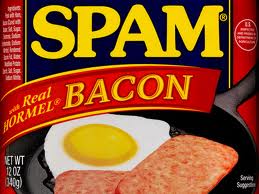Amy has Spam in her blood, being spawned in Albert Lea, Minnesota.
 Ted Genoways, a writer whose book “This Blessed Earth: A Year in the Life of an American Farm” will be published next year by W.W. Norton writes in the N.Y. Times Magazine that it was still dark when Jay hit the highway. At 6 o’clock that morning, he would be starting his first shift at Quality Pork Processors, part of the Hormel Foods complex in Austin, Minn., almost an hour’s drive down Interstate 90 from his rented apartment in Rochester. He’d applied for the job on the meatpacking line barely a week earlier and was still mentally preparing for it. “When you’re in the car,” he told me recently, “you have to go over everything again.” He had to remember his story: where he was from, why he was there. He had to remind himself what he could and couldn’t say. He was going to be meeting a lot of new people that day, and it would be essential not to arouse suspicions.
Ted Genoways, a writer whose book “This Blessed Earth: A Year in the Life of an American Farm” will be published next year by W.W. Norton writes in the N.Y. Times Magazine that it was still dark when Jay hit the highway. At 6 o’clock that morning, he would be starting his first shift at Quality Pork Processors, part of the Hormel Foods complex in Austin, Minn., almost an hour’s drive down Interstate 90 from his rented apartment in Rochester. He’d applied for the job on the meatpacking line barely a week earlier and was still mentally preparing for it. “When you’re in the car,” he told me recently, “you have to go over everything again.” He had to remember his story: where he was from, why he was there. He had to remind himself what he could and couldn’t say. He was going to be meeting a lot of new people that day, and it would be essential not to arouse suspicions.
Just before the exit off the Interstate, Jay passed an illuminated billboard for Austin’s Spam Museum: “Find slavation.” He steered down the winding road along the plant perimeter, past the high wall guarding the loading docks, until he came to the Q.P.P. employee entrance on Hormel Century Parkway. The factory was already enveloped in steam; overnight cleaning crews had hosed down the stainless-steel cutting line, and now the compound’s six-story hydrostatic Spam cooker was warming for the day shift. The steam billowed and swirled in the lights of the plant. Jay shuffled into the line of workers making their way through the employee turnstile. He swiped in and headed through the glass doors to where the day’s freshly laundered uniforms were being handed out, color-coded according to department.
“What station?” the person at the window asked.
“Gam table,” Jay said. His job would be slicing open the rear legs of hog carcasses, loosening the tendons of the trotters and inserting a gambrel. “It looks like a clothes hanger, but with hook tips that point up,” he told me. The gambrel attaches to a trolley that carries the carcass on a chain conveyor system as it is broken down into “primal cuts,” before being sent to the Hormel Foods side of the plant for final processing and packaging.
Jay knew that the job would be physically grueling. To keep up with the speed of the line, a carcass had to be cut and hung in about six seconds. But more than that, it was going to be psychologically — even morally — taxing for him. Jay had been a vegetarian since he was in college. He couldn’t say why he quit eating meat, really, only that he always loved animals and that his vegetarian younger sister convinced him.
But in recent years, Jay’s commitment had grown. He became a vegan. When he was online, he found himself drifting toward websites of animal rights groups, pulling up footage of abuse shot by undercover investigators. One day it occurred to him that he should try to find such work. On a job site, he found an opening at Compassion Over Killing, or C.O.K., an advocacy group intent on ending cruelty to animals in agriculture and promoting vegetarianism. And just like that, he entered the shadowy world of undercover video activism, where no one around you knows whom you really work for and few people, not even your family and friends, know where you are or what you’re doing for months at a stretch. (To protect his identity, Jay uses only his middle name when speaking to reporters.)
Now, as Jay dressed in the locker room, put on a hard hat and picked up gloves in the equipment room, he could feel a weight descend on him. Once you’re inside, he said, you realize how alone you are. “You’re going to be out there pretty much by yourself,” he told me. “You’re going to be working these really long hours and seeing animal abuse on a day-to-day basis.”
His manager at C.O.K. had warned him that it would be months before he could transfer to the kill side of the plant, where live animals are handled, and weeks more before he would have enough video to complete the investigation. Every day for five or maybe six months, Jay would have to walk past posters reminding employees that all cameras were strictly prohibited inside the plant and to immediately report any suspicious individual, even if that person was a co-worker. The isolation and paranoia can be consuming, he said, coloring every sidelong glance, every passing conversation.
The story goes on to document how futile the mantra of USDA-inspected actually is.
So some spamalot, and Albert Lea’s own, Eddie Cochran.


 We have been preparing a new site, with new software, over the summer, but it isn’t ready yet.
We have been preparing a new site, with new software, over the summer, but it isn’t ready yet.